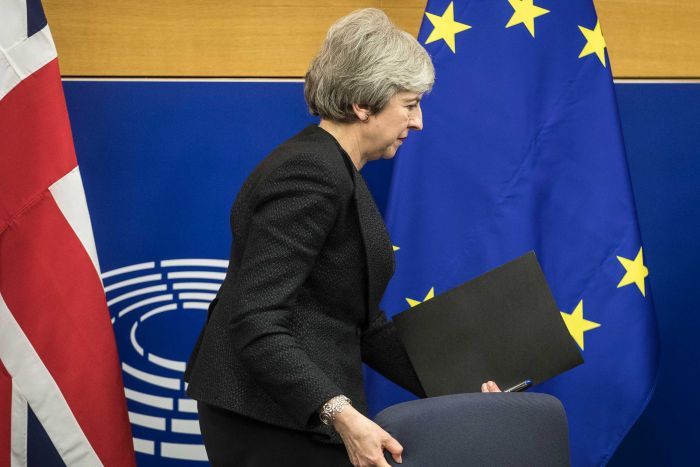
Theresa May and her cabinet are looking for ways to bring her EU withdrawal agreement back to the Commons for a fourth attempt at winning MPs’ backing.
The PM said the UK would need “an alternative way forward” after her plan was defeated by 58 votes on Friday.
MPs from all parties will test support for other options during a second round of “indicative votes” on Monday.
But government sources have not ruled out a run-off between whichever proves most popular and the PM’s Brexit plan.
Labour leader Jeremy Corbyn has called on Mrs May to change her deal or resign immediately, while Northern Ireland’s DUP – which has propped up Mrs May’s minority government – also continues to oppose the deal.
They insisted efforts were “going in the right direction”, given the margin of defeat was down from 149 a fortnight ago.
Leave voters registered their anger at the latest rejection, on the day the UK was originally scheduled to leave the EU.
Thousands gathered outside Parliament to protest against the delay, bringing traffic to a standstill.
And the Conservative former Attorney General Dominic Grieve, who has campaigned for a further referendum on the deal, lost a vote of no-confidence in his Beaconsfield constituency.
It is highly likely that at least for another couple of weeks, Theresa May will look through every nook and cranny in Parliament to see if there is a way for her deal to pass through – somehow.
But that’s a decision taken in the bunker, and the walls are closing in.
There is little reason to think that, in the end, the burning core of Euroscepticism in the Tory Party will ever accept her deal.
There are few signs that any more than a handful of Labour MPs are really going to take the plunge and ultimately walk through the same lobbies as Theresa May, and Boris Johnson and Iain Duncan Smith.
The prime minister concluded on Friday that our political process is reaching its limits.
But maybe soon it will be her leadership, her deal, that has passed its limits.
Mrs May has until 12 April to seek a longer extension to the negotiation process to avoid the UK leaving without a deal, which most MPs believe could harm business and create disruption at ports.
He said it would take a “miracle” – and the support of up to 150 Conservatives – on Monday for a majority of MPs to back a Brexit option that supported staying in the customs union.
This allows businesses to move goods around the bloc without checks or charges but continued membership would bar the UK from striking independent trade deals.
“If the prime minister can’t accept that then she must go, not at an indeterminate date in the future but now. So that we can decide the future of this country through a general election.”
